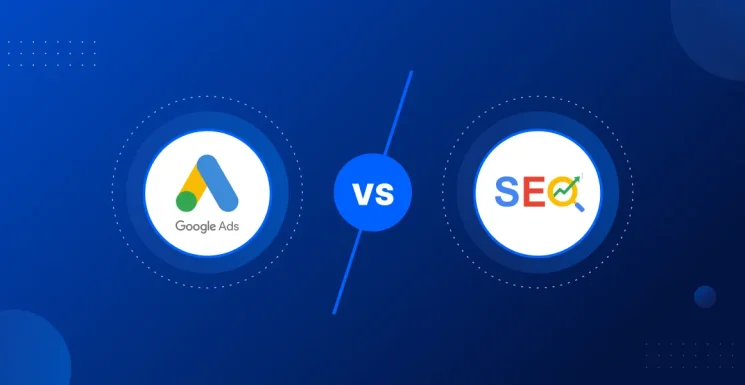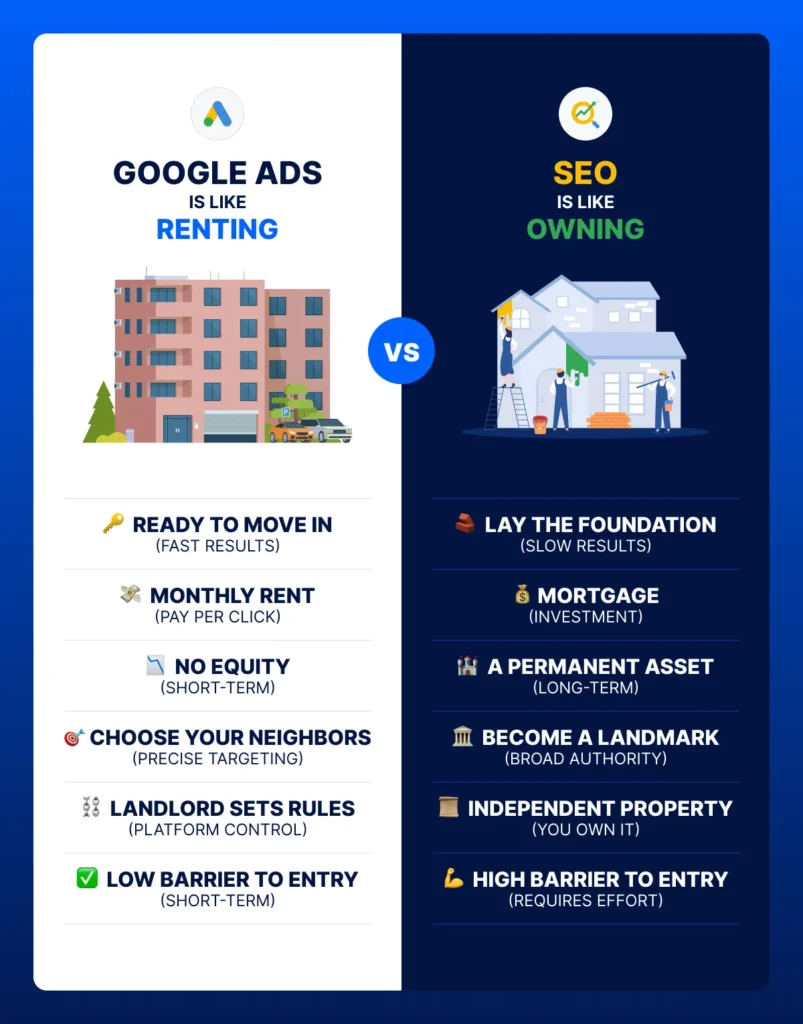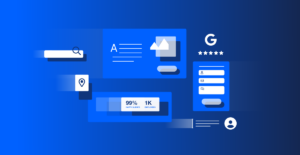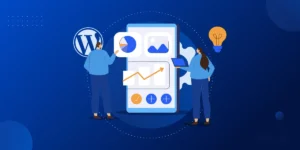As an MSP owner, you know that a steady stream of qualified leads is the lifeblood of your business, but figuring out where to invest your marketing budget can be confusing. You’re likely asking a critical question: ‘Should I invest in Google Ads for quick results or build a long-term foundation with SEO?’
This isn’t just about choosing a marketing tactic; it’s about making a strategic business decision that impacts your growth for years to come. You need a clear, no-fluff answer tailored specifically to the unique challenges and opportunities of the managed services industry.
Drawing on over 15 years of experience and insights from working with more than 2,500 MSP clients, we’re here to break down the pros, cons, and realistic outcomes of each strategy for your MSP.
Key Takeaways
- Google Ads for Immediate Impact: Google Ads offers the fastest path to getting in front of potential clients who are actively searching for MSP services right now.
- SEO for Sustainable Growth: SEO is a long-term investment in building your brand’s authority and creating a valuable asset that generates “free,” organic leads for years to come.
- The Right Choice Depends on Your Goals: Your ideal starting point depends on your immediate business needs, budget, and timeline. We’ll help you decide.
- The Ultimate Strategy is Integration: The most successful MSPs don’t choose one or the other; they build a powerful marketing engine where Google Ads and SEO work together.
5-step Checklist for MSPs to Choose Google Ads, SEO or Both
Below is a practical checklist to walk your MSP through deciding whether to launch a Google Ads campaign, invest in SEO, or integrate both:
☐ 1. Define Your Objectives & Timeline
- Do you need leads in the next 90 days?
- Or is building long-term brand authority your priority?
☐ 2. Audit Your Website & Content Readiness
- Is your site fast, mobile-friendly, and optimized for conversions?
- Do you have at least 5–10 cornerstone blog posts or service pages to kick-start SEO?
☐ 3. Evaluate Budget & Cashflow
- PPC requires ongoing spend (“rent”); SEO needs upfront investment in content and link building (“mortgage”).
- Ensure you can fund at least 3–6 months of your chosen strategy without cashflow strain.
☐ 4. Factor in Your Sales Cycle Length:
- For long, consultative B2B cycles, SEO content nurtures prospects over time.
- For shorter or test-market campaigns, Google Ads lets you rapidly validate demand.
☐ 5. Select Channel(s) Based on Needs & Resources
- Mostly Immediate Results → Launch targeted Google Ads (local keywords + service-specific terms).
- Long-Term Authority → Build an SEO roadmap: keyword research, on-page optimization, link acquisition.
- Recognize that the most successful MSPs use both.
The Fundamentals: What Are We Really Talking About?
Before we compare these two channels, it’s essential to understand what they truly mean for an MSP. It’s not about generic definitions; it’s about how each tool works to attract and secure high-value managed services contracts.
What is SEO for an MSP?
Search Engine Optimization (SEO) is the process of optimizing your website and its content to rank organically (for free) on search engines like Google. For your MSP, this means strategically creating content that directly answers the questions your ideal clients are asking.
Think beyond just “IT support.” Effective MSP SEO target search queries like “how to improve business cybersecurity,” “benefits of outsourcing IT,” or more local and commercial searches like “IT consulting services in Los Angeles”.
The goal isn’t just traffic; it’s attracting business owners looking for a long-term strategic IT partner, not just a one-time “break-fix” solution. This involves creating helpful blog posts, optimizing your service pages for local search, and building your website’s authority over time.
👉 Read our ultimate guide for MSP SEO to learn more.
What is Google Ads for an MSP?
Google Ads, also known as pay-per-click (PPC), is a platform where you pay to place your MSP’s website at the top of search results for specific keywords. Its key benefit is speed—you can “turn on the traffic” and start generating calls and form fills almost immediately.
This power is in its precision. You can target potential clients in specific geographic areas (e.g., “IT support in Dallas”) who are searching for the exact services you offer (“outsourced cybersecurity monitoring”).
However, success hinges on a well-managed campaign to ensure you’re not wasting your budget on irrelevant clicks from residential users or break-fix shoppers.
👉Read our ultimate guide for MSP AdWords Management to learn more.
Google Ads vs. SEO: A Head-to-Head Comparison for MSPs
To make an informed decision, you need a clear, direct comparison of these channels across the factors that matter most to a business owner.
| Feature | Google Ads | SEO (Search Engine Optimization) |
|---|---|---|
| ⏱️ Speed to Results | Fast: Can generate leads within days or even hours of launching a campaign. | Slow: Typically takes 4-12 months to see significant, consistent results. |
| 💰 Cost Structure | Pay-to-Play: You pay for every click. When you stop paying, the traffic stops. | Upfront & Ongoing Investment: Requires investment in content and optimization, but traffic is “free” once you rank. |
| 🌳 Longevity | Short-Term: Results are immediate but disappear the moment you turn off your budget. | Long-Term Asset: A high-ranking page becomes a sustainable lead-generation asset that works 24/7. |
| 🎯 Targeting Precision | Highly Precise: Target by keyword, location, demographic, and user intent with incredible accuracy. | Broad & Intent-Based: Targets topics and intent, but with less granular control than paid ads. |
| 🛡️ Trust & Credibility | Lower: Users know it’s a paid advertisement. | Higher: Organic results are often perceived as more trustworthy and authoritative. |
Renting or Owning Your Web Traffic
Let’s simplify this a little more with the analogy, Renting vs. Owning.
The Renter’s Path: Google Ads
Paid ads are like renting a great apartment. It’s fast—you can launch a campaign and get traffic within hours. It’s also precise, allowing you to target the exact audience you want. This strategy is perfect for immediate results, like promoting a sale or a new service.
However, there’s a catch. The moment you stop paying your “rent” (your ad budget), the traffic disappears. You’re left with nothing to show for it because you never built any equity. It’s a constant expense just to stay visible.
The Homeowner’s Strategy: SEO
Search Engine Optimization (SEO) is like building and owning your own house. It’s a slower process that requires an upfront investment of time and resources to create valuable content and build authority. You won’t see results overnight.
But the payoff is immense. Once your website starts ranking on Google, it becomes a permanent asset that generates a steady stream of “free” traffic, 24/7. This organic presence builds trust and credibility that you can’t buy. You own this digital real estate, and it grows in value over time.
How to Choose: The Right Search Engine Marketing Strategy for Your MSP’s Goals
The best starting point depends entirely on your current business situation. Here are some clear scenarios to help you decide where to prioritize your investment right now.
You Should Prioritize Google Ads If…
- You Need Results in 90 days: If your sales pipeline is drying up and you need to generate opportunities within the next 3 months, Google Ads is the most direct path. This can be done simultaneously as you build your SEO foundation.
- You Have a New Website: While you wait for your SEO efforts to gain traction (which takes time), Google Ads can drive instant, targeted traffic to your new site and start the lead generation process from day one.
- You’re Testing a New Service or Market: Google Ads is the perfect tool to quickly validate demand. You can test a new cybersecurity package or expand into a neighboring city and get real-world data on its viability before investing heavily in content and sales resources.
Important Assumption: For all three scenarios, you should have enough cashflow for at least 3 to 6 months. While Google Ads can deliver results faster, especially for B2C companies, the search volumes for MSPs aren’t as high as for other consumer services and thereferore ROI may vary, especially with demand seasonality and location.
You Should Prioritize SEO If…
- You’re Building a Long-Term Brand: If your primary focus is on becoming the go-to, authoritative MSP in your market, SEO is a non-negotiable investment. It builds brand equity and trust that pays dividends for years.
- You Have a Limited Ongoing Budget: While SEO requires an upfront and ongoing investment, it can deliver a significantly lower long-term cost-per-lead once your rankings are established. The leads you generate from your established rankings are essentially free.
- Your Sales Cycle is Long: The B2B buying journey for managed services is often long and complex. SEO is perfect for nurturing these prospects with valuable, educational content that builds trust and keeps your MSP top-of-mind from initial research to final decision.
The Real Answer: Why the Smartest MSPs Use Both
The “Google Ads vs. SEO” debate often presents a false choice. The most effective marketing strategies don’t silo these channels; they integrate them to create a system where each one makes the other more powerful.
A truly sophisticated strategy uses data from one channel to fuel the other. For instance, the keyword and conversion data gathered from a well-run Google Ads campaign can provide invaluable, real-world insights to guide your long-term SEO content strategy. This integrated methodology is a hallmark of experienced MSP marketing agencies who understand that short-term data should inform long-term asset building.
This approach allows you to dominate the search results page. You can capture immediate-need leads with ads while building organic rankings for the very same high-converting keywords.
👉Read our MSP Marketing Guide to learn more useful strategies.
Common (and Costly) MSP Search Engine Marketing Mistakes to Avoid
Understanding the difference between these channels is only the first step. Executing them effectively requires avoiding common pitfalls that we see MSPs make time and again.
- Mistake #1: Using Broad Keywords. One of the most common mistakes is bidding on overly broad keywords like “IT support.” This often attracts low-value, residential, or break-fix clients instead of the lucrative managed services leads you want. With a long sales cycle and high customer lifetime value, precision is key.
- Mistake #2: Neglecting the Landing Page Experience. Driving traffic—from either SEO or Ads—to a slow, confusing, or generic homepage is one of the fastest ways to waste your marketing spend. Your landing pages must be clear, fast, and focused on a single call to action.
- Mistake #3: Setting and Forgetting. Both SEO and Google Ads require continuous monitoring, analysis, and optimization to deliver a positive ROI. They are active strategies, not passive, one-time tasks.
Having worked with literally thousands of MSPs, a recurring theme we’ve seen is the absolute necessity of a marketing strategy tailored to the unique buying journey of an MSP client. Generic approaches simply don’t work.
Want to avoid making mistakes? Rely on Pronto’s Google AdWords management and SEO services
Conclusion: Building Your MSP’s Lead Generation Engine
Ultimately, the debate isn’t “Google Ads vs. SEO.” It’s about strategically deploying the right tool, at the right time, for your specific business goals.
The path to sustainable growth is clear: use Google Ads for immediate, targeted lead flow and to gather critical market data. Simultaneously, invest in a robust SEO strategy to build a long-term, high-value asset that establishes your brand as an industry leader and generates a consistent stream of organic leads.
By making these two powerful channels work in harmony, you move beyond simple tactics and begin building a true lead generation engine for your MSP.
Still unsure which path is right for your unique business goals and budget? Schedule a no-obligation consultation with one of our MSP marketing specialists.





